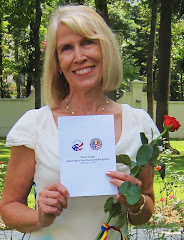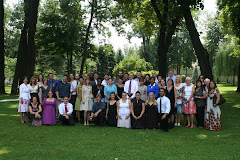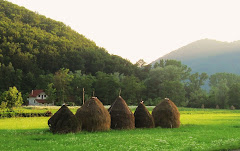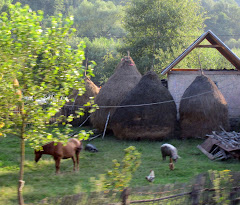Saturday, November 13, 2010
The Strength of Constancy
Before you read this, note the disclaimer to the right and understand that my comments are merely the observations of one who has lived here six months, not a sociologist, historian, nor theologian, and certainly not one who speaks for my government and its programs. Since I first arrived, I have struggled to understand the complex relationship between the government of Romania and the Orthodox church. While theoretically there is separation of church and state, in practice they seem tightly woven into a fabric that defies fraying. Here's what I've found through personal observations, comments from others, and online research (mainly having to do with the education system since that's my arena). In every school I've entered here, I've noticed icons of holy figures on the walls of halls and classrooms. Religious messages and notices are on bulletin boards. The state curriculum requires that religion classes be taught--in theory, as non-denominational , but in practice many times they are taught by priests or by teachers whose own orientation is Orthodox. The state pays salaries to priests and augments construction of church buildings. Schools participate in a point-gathering competition throughout the year and one way to gain more points is to have iconic art created by students for a regional exhibit. Priests bless the schools at opening day ceremonies and holy days are observed in schools. I'm sure there are more connections I've yet to learn about, but these have caught my attention and were at first shocking to this American with liberal principles firmly ingrained. Gradually, however, I've come to a better understanding of the importance of the church as a constant in the lives of people who have endured feudal lords, barbaric invasions, vicious monarchs, dictators, communism, frequent redrawing of country borders to add or subtract large tracts of land and ethnic populations, and rampant government corruption. The church has been there from the earliest times and has survived even through the years of atheist communist rule, by means not always noble but certainly pragmatic, in order to keep church doors open and parishioners served. It is a quintessentially paternalistic institution and has come to be--for the 87% of the Romanian population who identify themselves as Orthodox--a symbol of nationalism, its beautiful churches and cathedrals aesthetic foils to the horrors of communist architecture, its solemn traditions and elaborate ceremonies points of pride. It serves an important role in Romanian life and has offered stability and order where other institutions have failed. "If I ruled the world," would I have the church less entangled with the government? You bet I would. But I can at least understand WHY things are as they are...and will be long after I'm gone.
Subscribe to:
Post Comments (Atom)







This is interesting rumination, Clela. Having the new "link" to Orthodoxy in my family has given me/us opportunity to think along some of the same lines. I think it isn't nearly such a clear division here as it must be there. It is interesting, and maybe a little peculiar, that I find myself with greater appreciation of the role of religious practices when I am away from home. Maybe it is a part of my genuine efforts to embrace other cultures, or maybe it is the isolation that comes with not be a part of a locale. Whatever the cause, the effect is most interesting to me. The roles of the institutions of religion, culture, and government are intertwined in such depth that we could probably probe these questions for a long time and still be unsure of our personal responses. I'd love to hear more about the ways that you witness the public and private expressions of faith in the Romanians' lives. (I just re-read what I wrote and am not sure if it makes sense or not. Oh, well. Maybe you'll intuit.)
ReplyDeleteJust a few corrections I'd like to make:
ReplyDeleteGradually, however, I've come to a better understanding of the importance of the church as a constant in the lives of people who have endured feudal lords,
Feudalism was the best time for the Church, they owned a really large part of the lands and were acting as the State, literally. The hardships of the feudal era we're not alleviated by the Orthodox churches, but they exacerbated, assited or directly caused by it.
barbaric invasions, vicious monarchs,
Not really a relation here; it was just an insane period. "Great" lords and leaders would built churches when losing or winning battles with the turks, but politically speaking it was still feudalism and the leaders often paid tribute to foreign powers in order to conserve their rule. The culture not constant, the life was constant: work, farm, work, farm, ..., the life of the slave. Just like in the USA, christianity was used to pacify slaves and keep them in line.
dictators, communism,
Well there was the fascist dictatorship, which had an outspoken orthodox christian faith and support, and extremism. Than there were the stalinist regimes, which were not officialy christian, but they were supported by many many christians. Not only that, but the Romanian Orthodox Church has a very long and "constant" habit of collaborating with the regimes in power - and the communist rule was no exception.
The grand patriarch praised the dictators and the "great work" of the communists. I suppose this was also due to the fact that the authorities cracked down on other cults, such as the catholics, protestants and many others who LOST many lands in cities and rural areas... lands which were given to the Orthodox Church.
The Orthodox Church has done even worse things, but they were not Romanian in nature. During the entire stalinist/communist rule, the OC has collaborated with the security institutions, using priests as informants. This was common practice, and if you had relations in the West, you might get smart advice as to "don't talk to priests". This was also common practice in Soviet Russia.
Your observation is basically sound, but your interpretation is way off. The Orthodox Church has been the anchor and the blindfold of romanians, always working against their interest, leading them into backwardness, feudalism, poverty and drudgery. It's because of the orthodox christian culture that stalinism had thrived (it might have looked atheistic, but if so - where are all the atheists produced by decades of Communism? the census shows over 80% of romanians as orthdox christians).
It's the same mentality which sustains the tolerance for corruption: respect for authority - something which is explicitly taught by orthodox priests... "Never question the president, he's THE LEADER". This is how corruption thrives.
ReplyDeleteThe current relation between the Church and the Stat is like the relation between the military industry in USA and Washington... The Orthodox Church helps politicians get votes by "leading the flock to the ballot", while the politicians pay the Church in various ways... from salaries, to free land all over place (including high class city areas), to ignoring regulations for constructions in the city, to forcing the teaching of christianity in schools, to just giving tax payer money for diverse OC projects.
This process is going on today, even in recession/depression; in fact - the privileges of the Orthodox Church are growing, has it has received more and more money and lands in the past years after the financial crisis, EVEN though many other important services and social nets have been cut or destroyed. So now romanian hospitals are falling apart, patients have to bring their own first aid materials and drugs, doctors are leaving for a place with decent wages... but each hospital has an orthodox priest which has a guaranteed salary and job (this is fairly new)... and local churches keep getting built from local budgets, despite hospitals and school being in much greater need of funds. ...This is how we return to feudalism.
-- I've tried to summarize a solid critique in as small a space as possible, but the truth is far larger and uglier.
These are interesting comments, and I certainly am not knowledgeable enough to debate them. However, I think that the discussion has side stepped one primary issue that has to be considered any time we talk about religion and its place in a culture. That issue is faith. Faith is the quality that allows us to turn to something / someone to find our reason to be. It has certainly been historically accurate that religions have fostered bad and painful social and political times. However, faith also individually and collectively strengthens people to live their lives within a framework which gives them meaning, courage, and hopefulness. It would seem to me that this is what you may be observing, Clela. This framework is critical to cultures that embrace -- by habit, by choice, or by inheritance -- religion as a part of their daily lives.
ReplyDeleteWell, if you live longer in Romania, you will find out that most people actually have no faith, but rather have much superstition. I, myself, prefer to use the word "trust" instead of "faith", which has too many meanings ...
ReplyDeleteThere is little trust and little faith here, as most people feel divided and powerless... which makes them predictable and easy to manipulate (our political class is proof of this).
I would love to agree with you, but the truth is romanian history has almost always been a story about the worst case scenario. There have been very few "rests" in the romanian tale. It has always sucked, so people got used to it and many romanians are very stoic about it.
This is not really due to faith, though it would appear that way, but more to being continuously stressed and abused. It's the main thing most of us, romanians, have in common (but this is has changed due to economic polarization).
You'll find many romanians open and friendly, with resilience and stoic attitudes, but doubtful of change and reticent of strangers, and very superstitious... this is how the national psychosis manifests itself. Also, superstitious beliefs are based on mentality which comes about due to lack of power over your life and the surrounding society, as a means to try to establish some power and order over chaos... sadly it doesn't actually sustain progress, so Romania is still, basically, a third world nation.
P.S. here's an info-graphic with the sums of money, calculated in $, given by different romanian regimes to the "cults" (mainly the Orthodox Church):
ReplyDeletehttp://i.imgur.com/ytM5M.jpg
It's the biggest "lobby"...
Link: http://i.imgur.com/ytM5M.jpg
ReplyDeleteMost of my (admittedly limited) knowledge on this comes, again, from my experience in Russia, but I think the situation in Romania is fairly parallel. The Orthodox Church, as an institution, is pretty darn corrupt and has been for a lo-o-o-ng time. You can argue that perhaps it had to be to some extent to survive Communism. But it has committed staggering sins and needs to ask the people's forgiveness and dedicate itself to reform.
ReplyDeleteThat said, however, I find the Eastern Orthodox faith to be one of tremendous beauty, both in its theology and liturgy (not to mention music, art, and architecture). So while I understand that the various Slavic peoples wounded by the misdeeds of the institutional Orthodox Church may turn away from it as they seek spiritual sustenance, it pains me deeply to see the inroads being made in Russia, at least, by proselytizing groups such as Baptists, various other fundamentalist protestant groups, and of course Mormons. I would vastly prefer that the Orthodox Church straighten itself out enough that it could become the right fit for its people, both spiritually and culturally.